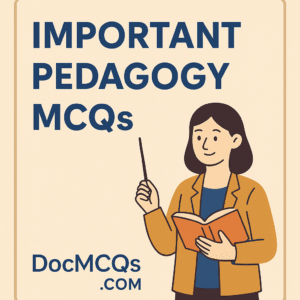Pedagogy MCQS
Pedagogy MCQS pdf For SST Preparation . These includes Curriculum Development MCQS, Educational Psychology MCQS, Assessment and Evaluation MCQS, Administration and Management Teaching Methods MCQS
Table of Content
- 1000 Pedagogy MCQs
- Classroom Management MCQS
- Curriculum MCQS
- Education in Sub-continent
- Educational Philosophy MCQs
- Educational Psychology MCQS
- Guidance and Counselling MCQS
- Headmaster Past Paper 2024 AJKPSC
- Introduction to Education
- Research Methodology MCQs
- Teaching Methods MCQs
- Testing and Evaluation MCQs
- use of ict in education

The secondary school teacher is directly responsible to:
The idea that “Knowledge must be acquired through one of the senses” is known as:
Chairperson of the school council is:
The early roots of psychology are firmly planted in philosophy and:
What is associated with fear and anger?
The amygdala is a part of the brain that plays a key role in regulating emotions, especially fear and anger. It is responsible for processing emotional reactions and is crucial for the body's response to threats. When people encounter something that causes fear or anger, the amygdala is activated, triggering a fight-or-flight response.
Here’s a quick breakdown of the other brain structures mentioned:
Hippocampus: Primarily involved in memory formation and spatial navigation, but not directly responsible for fear or anger.
Hypothalamus: Regulates autonomic functions like hunger, thirst, body temperature, and the release of hormones, and it is indirectly involved in emotional responses, but not specifically tied to fear and anger.
The view that a single God exists is known as:
Here's a breakdown of the other terms:
Deism: Belief in the existence of a creator who does not intervene in the universe or the affairs of humans.
Atheism: The absence of belief in the existence of any gods or deities.
So, theism covers the belief in a single God, as in monotheism, or multiple gods, as in polytheism.